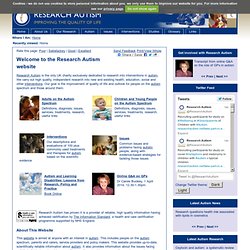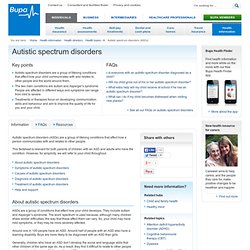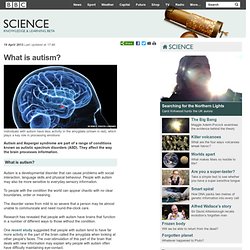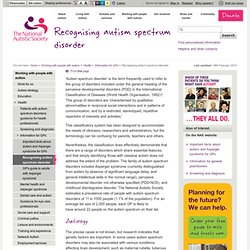

The National Autistic Society: Accept difference. Not indifference. - NAS. Research Autism, researching autism treatments and therapies for autism spectrum disorders. Rate this page: Poor | Satisfactory | Good | ExcellentPrint/View WholeSend Feedback Research Autism is the only UK charity exclusively dedicated to research into interventions in autism.

We carry out high quality, independent research into new and existing health, education, social and other interventions. Our goal is the improvement of quality of life and outlook for people on the autism spectrum and those around them. Research Autism has proven it is a provider of reliable, high quality information having achieved certification by The Information Standard, a health and care certification programme supported by NHS England. This website is aimed at anyone with an interest in autism. What People Say about this Website ‘Having autism myself and having children with autism this site is most refreshing, it’s up to date info, on all aspects of ASD highly recommended by myself and recommended on my autism forum, a first stop for newly diagnosed individuals/parents and us veterans’. PEACH : Home. Teachernet, Autistic Spectrum Disorders.
Autistic spectrum disorders (ASDs) - information, symptoms and treatments. Autistic spectrum disorders (ASDs) are a group of lifelong conditions that affect how a person communicates with and relates to other people.

This factsheet is relevant for both parents of children with an ASD and adults who have the condition. However, for simplicity, we will refer to your child throughout. About autistic spectrum disorders ASDs are a group of conditions that affect how your child develops. They include autism and Asperger’s syndrome. Around one in 100 people have an ASD. Generally, children who have an ASD don’t develop the social and language skills that other children of the same age do. Autism Children with autism have difficulty communicating and interacting with others.
Asperger syndrome Asperger syndrome is a type of autism. Symptoms of autistic spectrum disorders If your child has an ASD, he or she will have symptoms that affect the way he or she communicates. You may notice some of the symptoms and behaviour of ASDs when your child is very young. Social skills. Clinical Knowledge Summaries - Patient information leaflet - Autistic spectrum disorder.
Health: Autism. 19 April 2013Last updated at 17:40 Individuals with autism have less activity in the amygdala (shown in red), which plays a key role in processing emotions Autism and Asperger syndrome are part of a range of conditions known as autistic spectrum disorders (ASD).

They affect the way the brain processes information. Autism is a developmental disorder that can cause problems with social interaction, language skills and physical behaviour. People with autism may also be more sensitive to everyday sensory information. To people with the condition the world can appear chaotic with no clear boundaries, order or meaning. The disorder varies from mild to so severe that a person may be almost unable to communicate and need round-the-clock care. Research has revealed that people with autism have brains that function in a number of different ways to those without the condition. Specific nerve cells in the brain, called neurones, also act differently in people with autism. Recognising autism spectrum disorder - NAS. 'Autism spectrum disorder' is the term frequently used to refer to the group of disorders included under the general heading of the pervasive developmental disorders (PDD) in the International Classification of Diseases (World Health Organisation, 1992)1.

This group of disorders are 'characterised by qualitative abnormalities in reciprocal social interactions and in patterns of communication, and by a restricted, stereotyped, repetitive repertoire of interests and activities.' This classificatory system has been designed to accommodate the needs of clinicians, researchers and administrators, but the terminology can be confusing for parents, teachers and others. Nevertheless, the classification does effectively demonstrate that there are a range of disorders which share essential features, and that simply identifying those with classical autism does not address the extent of the problem. Aetiology The precise cause is not known, but research indicates that genetic factors are important.